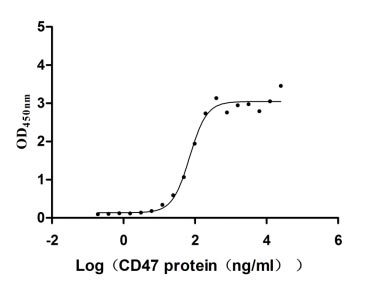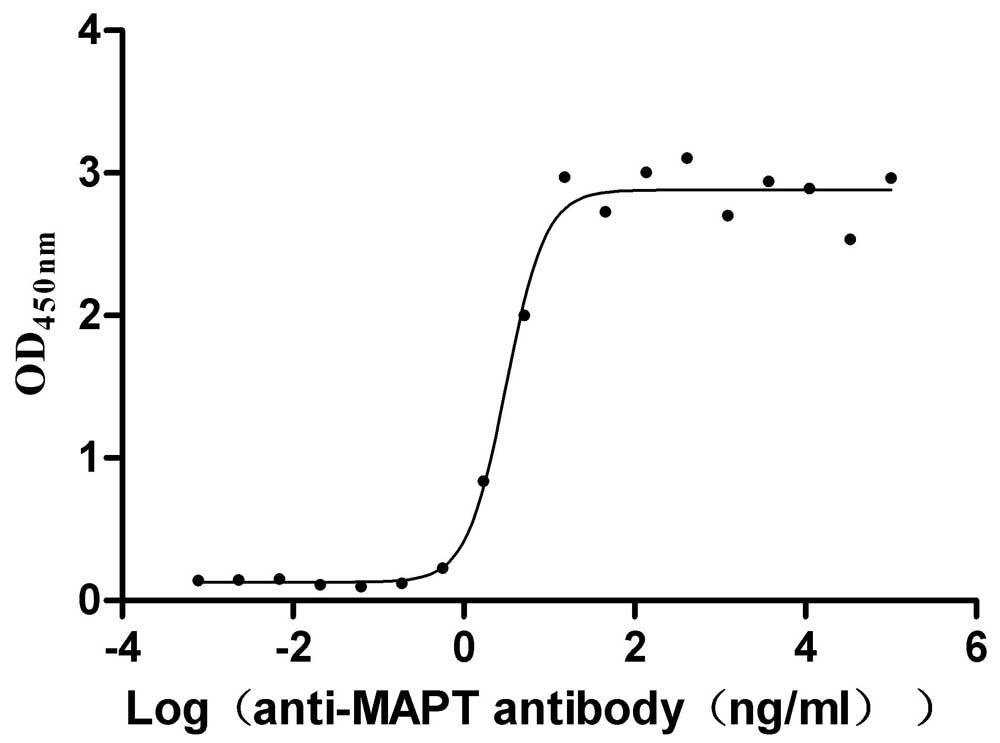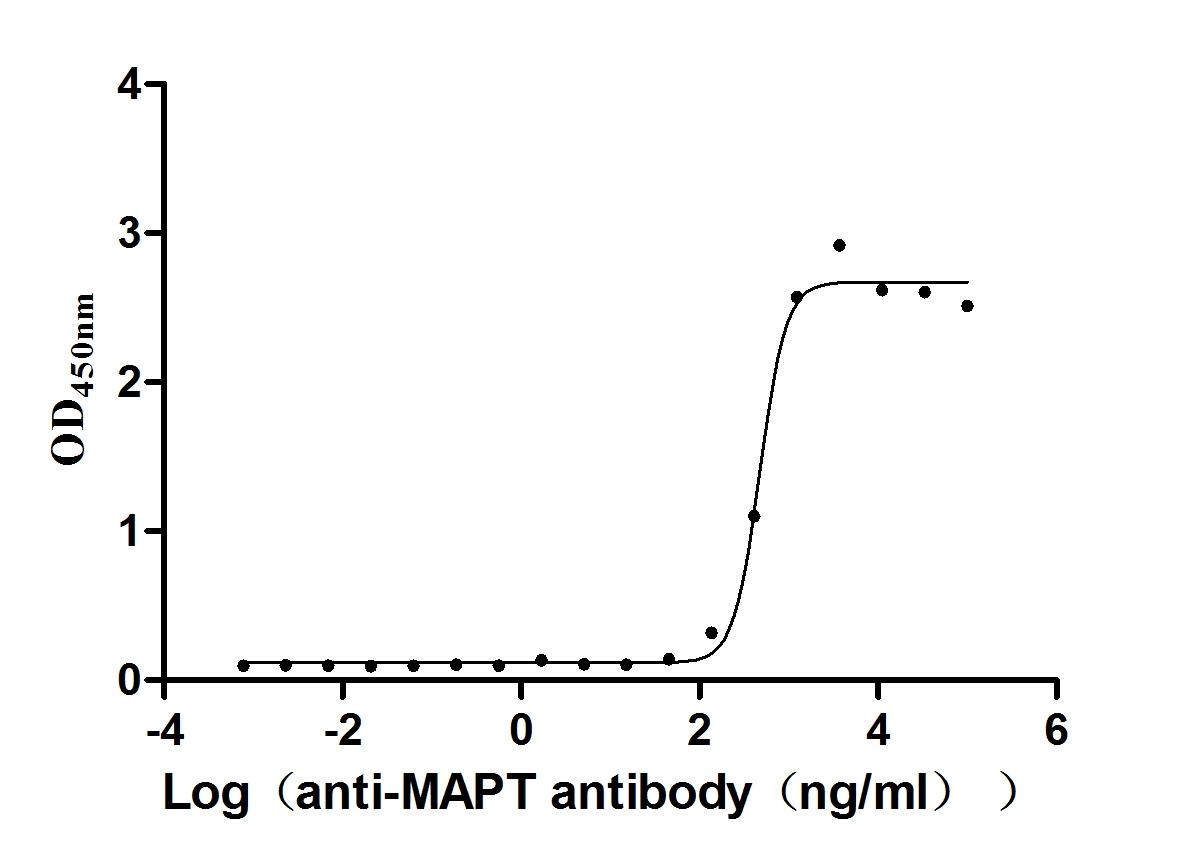Recombinant Human BTB/POZ domain-containing protein KCTD11 (KCTD11)
-
中文名稱(chēng):人KCTD11重組蛋白
-
貨號(hào):CSB-YP737961HU
-
規(guī)格:
-
來(lái)源:Yeast
-
其他:
-
中文名稱(chēng):人KCTD11重組蛋白
-
貨號(hào):CSB-EP737961HU
-
規(guī)格:
-
來(lái)源:E.coli
-
其他:
-
中文名稱(chēng):人KCTD11重組蛋白
-
貨號(hào):CSB-EP737961HU-B
-
規(guī)格:
-
來(lái)源:E.coli
-
共軛:Avi-tag Biotinylated
E. coli biotin ligase (BirA) is highly specific in covalently attaching biotin to the 15 amino acid AviTag peptide. This recombinant protein was biotinylated in vivo by AviTag-BirA technology, which method is BriA catalyzes amide linkage between the biotin and the specific lysine of the AviTag.
-
其他:
-
中文名稱(chēng):人KCTD11重組蛋白
-
貨號(hào):CSB-BP737961HU
-
規(guī)格:
-
來(lái)源:Baculovirus
-
其他:
-
中文名稱(chēng):人KCTD11重組蛋白
-
貨號(hào):CSB-MP737961HU
-
規(guī)格:
-
來(lái)源:Mammalian cell
-
其他:
產(chǎn)品詳情
-
純度:>85% (SDS-PAGE)
-
基因名:KCTD11
-
Uniprot No.:
-
別名:KCTD11; C17orf36; REN; BTB/POZ domain-containing protein KCTD11; KCASH1 protein; Potassium channel tetramerization domain-containing protein 11; RING-type E3 ubiquitin transferase subunit KCTD11
-
種屬:Homo sapiens (Human)
-
蛋白長(zhǎng)度:full length protein
-
表達(dá)區(qū)域:1-232
-
氨基酸序列MLGAMFRAGT PMPPNLNSQG GGHYFIDRDG KAFRHILNFL RLGRLDLPRG YGETALLRAE ADFYQIRPLL DALRELEASQ GTPAPTAALL HADVDVSPRL VHFSARRGPH HYELSSVQVD TFRANLFCTD SECLGALRAR FGVASGDRAE GSPHFHLEWA PRPVELPEVE YGRLGLQPLW TGGPGERREV VGTPSFLEEV LRVALEHGFR LDSVFPDPED LLNSRSLRFV RH
-
蛋白標(biāo)簽:Tag?type?will?be?determined?during?the?manufacturing?process.
The tag type will be determined during production process. If you have specified tag type, please tell us and we will develop the specified tag preferentially. -
產(chǎn)品提供形式:Lyophilized powder
Note: We will preferentially ship the format that we have in stock, however, if you have any special requirement for the format, please remark your requirement when placing the order, we will prepare according to your demand. -
復(fù)溶:We recommend that this vial be briefly centrifuged prior to opening to bring the contents to the bottom. Please reconstitute protein in deionized sterile water to a concentration of 0.1-1.0 mg/mL.We recommend to add 5-50% of glycerol (final concentration) and aliquot for long-term storage at -20℃/-80℃. Our default final concentration of glycerol is 50%. Customers could use it as reference.
-
儲(chǔ)存條件:Store at -20°C/-80°C upon receipt, aliquoting is necessary for mutiple use. Avoid repeated freeze-thaw cycles.
-
保質(zhì)期:The shelf life is related to many factors, storage state, buffer ingredients, storage temperature and the stability of the protein itself.
Generally, the shelf life of liquid form is 6 months at -20°C/-80°C. The shelf life of lyophilized form is 12 months at -20°C/-80°C. -
貨期:Delivery time may differ from different purchasing way or location, please kindly consult your local distributors for specific delivery time.Note: All of our proteins are default shipped with normal blue ice packs, if you request to ship with dry ice, please communicate with us in advance and extra fees will be charged.
-
注意事項(xiàng):Repeated freezing and thawing is not recommended. Store working aliquots at 4°C for up to one week.
-
Datasheet :Please contact us to get it.
靶點(diǎn)詳情
-
功能:Plays a role as a marker and a regulator of neuronal differentiation; Up-regulated by a variety of neurogenic signals, such as retinoic acid, epidermal growth factor/EGF and NGFB/nerve growth factor. Induces apoptosis, growth arrest and the expression of cyclin-dependent kinase inhibitor CDKN1B. Plays a role as a tumor repressor and inhibits cell growth and tumorigenicity of medulloblastoma (MDB). Acts as probable substrate-specific adapter for a BCR (BTB-CUL3-RBX1) E3 ubiquitin-protein ligase complex towards HDAC1. Functions as antagonist of the Hedgehog pathway on cell proliferation and differentiation by affecting the nuclear transfer of transcription factor GLI1, thus maintaining cerebellar granule cells in undifferentiated state, this effect probably occurs via HDAC1 down-regulation, keeping GLI1 acetylated and inactive. When knock-down, Hedgehog antagonism is impaired and proliferation of granule cells is sustained. Activates the caspase cascade.
-
基因功能參考文獻(xiàn):
- Our study demonstrates and supports that KCTD11, as well as negatively regulated downstream effectors belonging to Hh signaling, plays a role in prostate cancer pathogenesis. PMID: 25045667
- the protein is expressed in two alternative variants: a short previously characterized form (sKCTD11) composed by 232 amino acids and a longer variant (lKCTD11) which contains an N-terminal extension of 39 residues. PMID: 21237243
- findings identify KCTD11 as a widely down-regulated gene in human cancers, and provide a basis to understand how its expression might be deregulated in tumor cells PMID: 20591193
- Results identify REN(KCTD11) as a suppressor of Hedgehog signaling and suggest that its inactivation might lead to a deregulation of the tumor-promoting Hedgehog pathway in medulloblastoma. PMID: 15249678
-
組織特異性:Higher expression in cerebellum than in whole brain and lower expression in medulloblastoma.
-
數(shù)據(jù)庫(kù)鏈接:
Most popular with customers
-
Express system: Mammalian cell
Species: Homo sapiens (Human)
-
Recombinant Macaca mulatta Microtubule-associated protein tau (MAPT) (Active)
Express system: Mammalian cell
Species: Macaca mulatta (Rhesus macaque)
-
Recombinant Mouse Microtubule-associated protein tau (Mapt) (Active)
Express system: Mammalian cell
Species: Mus musculus (Mouse)
-
Recombinant Mouse CUB domain-containing protein 1 (Cdcp1), partial (Active)
Express system: Mammalian cell
Species: Mus musculus (Mouse)
-
Recombinant Rat Gastric inhibitory polypeptide receptor (Gipr), partial (Active)
Express system: Mammalian cell
Species: Rattus norvegicus (Rat)
-
Recombinant Human Myosin regulatory light chain 12A (MYL12A) (Active)
Express system: E.coli
Species: Homo sapiens (Human)
-
Recombinant Human Transmembrane 4 L6 family member 1(TM4SF1)-VLPs (Active)
Express system: Mammalian cell
Species: Homo sapiens (Human)
-
Recombinant Macaca fascicularis Cadherin 6(CDH6),partial (Active)
Express system: Mammalian cell
Species: Macaca fascicularis (Crab-eating macaque) (Cynomolgus monkey)




















